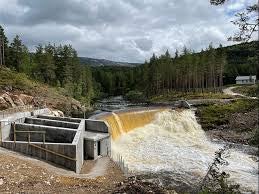Albion Community Power (ACP) has announced it has committed close to £5 million to the development of two new hydropower schemes in the Scottish Highlands.
The company – which has secured investment from the UK Green Investment Bank, Strathclyde Pension Fund and Greater Manchester Pension Fund – will put £4.8 million into the Liatre Burn and Abhainn Bruachaig run of river schemes, which together will generate 2.8 GWh of renewable electricity per year.
The 500kW high-head Liatre Burn scheme is located near Loch Mullardoch in Glen Cannich, some 35km south-west of Inverness whilst Bruachaig is a medium-head 500kW run-of-river scheme located close to Kinlochewe in the western highlands. Construction of both projects is already underway with completion of the construction programme and commissioning of the schemes anticipated before the end of the year.
They are the third and fourth community-scale Scottish hydro projects that ACP is developing. Construction of the first two schemes – Chaorach, near Crianlarich, and River Arkaig, in Lochaber – is in advanced stages and both are expected to be fully commissioned by the end of Q3 2016.
"We are delighted to announce two new projects as we continue to invest in small-scale hydropower," said Volker Beckers, Chair, Albion Community Power. "ACP’s expertise in hydro-power combined and enhanced by local knowledge supports the government’s SME and local business campaign. Hydropower, the oldest renewable technology, has a proven track record of generating strong and stable returns for investors.
"Institutional demand for community-scale renewable energy continues to grow and ACP is well placed to benefit from this trend. We look forward to working on both schemes, as well as developing a further pipeline of projects."
Ed Northam, Head of Investment Banking, UK Green Investment Bank, added: "Community-scale projects improve the efficiency of the network by generating electricity close to where customers need it. We believe that decentralised schemes like Liatre Burn and Bruachaig are an important part of the energy mix and have a significant role to play in increasing security of supply, reducing costs and cutting greenhouse gas emissions."






